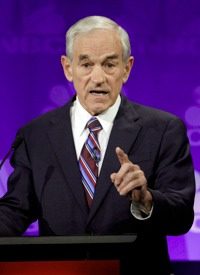
Video reveals that the longtime Texas Congressman was significantly ahead of the others just prior to the poll being removed from CNBC’s website and replaced with an article entitled, “Who won the debate — Attendees weigh in.”
Just before the poll was removed, Ron Paul was leading with 62 percent of the vote, followed by Newt Gingrich with 12 percent of the vote, and Mitt Romney and Herman Cain with 9 percent.
CNBC’s managing editor Allen Wastler issued the following statement to explain why the poll was removed:
Gamed Poll … So We Took It Down
We had a poll up from our Republican Presidential Debate asking readers who they thought won. One candidate was leading by such a margin that it became obvious the polling wasn’t so much a reading of our audience, but of the Internet prowess of this particular candidate’s political organization. We have therefore taken the poll down. Yes, we’ve gone through this exercise before.
CNBC made a similar decision in 2007, when exactly the same thing was taking place. In his statement, Wastler included a link to the 2007 statement as well, which was entitled “an open letter to the Ron Paul faithful.” The letter sarcastically began by saying, “Congratulations, you folks are obviously well-organized and feel strongly about your candidate and I can’t help but admire that.” The letter continued, however:
Paul is a fine gentleman with some substantial backing and, by the way, was a dynamic presence throughout the debate, but I haven’t seen him pull those kind of numbers in any "legit" poll. Our poll was either hacked or the target of a campaign. So we took the poll down.
You ruined the purpose of the poll. It was no longer an honest "show of hands" — it suddenly was a platform for beating the Ron Paul drum. That certainly wasn’t our intention and certainly doesn’t serve our readers … at least those who aren’t already in the Ron Paul camp.
Some of you Ron Paul fans take issue with my decision to take the poll down. Fine. When a well-organized and committed "few" can throw the results of a system meant to reflect the sentiments of "the many," I get a little worried. I’d take it down again.
As noted by Steven Watson, however, any serious online poll restricts voting to one per IP address. Likewise, Watson adds, “Wastler bemoans the fact that Paul’s online supporters came in droves to vote, yet he does not consider why supporters of the same candidates did not do the same.”
Alt-Market’s Brandon Smith asserts that CNBC’s decision to pull the poll was virtually intended as punishment against Ron Paul’s supporters for being highly motivated.
“What margin of success does CNBC consider “realistic” for a presidential candidate?” Smith writes. “I mean, is it really necessary for you to punish Ron Paul for being a popular candidate, or to punish his supporters for being well organized and showing up for the vote? Do you not see the … absurdity of your claim that Ron Paul won by ‘too much’?”
Likewise, Smith went on to question the authenticity of CNBC’s claims that the poll was "gamed," (i.e. hacked).
Above all, Smith questioned the motivation behind removing the poll by asking, "If Mitt Romney had won the poll by a landslide, would CNBC have suppressed the results then? Or is it only farfetched when Ron Paul prevails in the final calculations?
It is becoming increasingly clear that Ron Paul is perceived as a threat by the mainstream media and is therefore treated unfairly by it. A University of Minnesota study confirmed recently that Paul has been given the least amount of time of all the candidates to speak at the debates.
And the times when Paul is provided the opportunity to speak prove to be heavily critiqued. Jack Hunter of Paulitical Ticker observed, “So CNBC puts up the graphic that tuition prices have gone up nearly 500% since the inception of student loans and American student debt is now $1 trillion — and they seem to insinuate that Ron Paul is somehow being unrealistic in wanting to change the status quo. Unbelievable.”
Midway through Paul’s answer, one of the anchors interrupted to ask, “How are students going to pay for education?” Paul immediately responded, “The same way you pay for computers and cellphones,” emphasizing the need for healthy competition that will naturally bring down the cost of education while simultaneously improving its quality.
Still, despite the biased handling of Paul’s campaign successes, his campaign chairman Jesse Benton, as well as GOP leaders in Iowa, contend that Paul is the only other candidate besides Romney to have strong enough support to carry him through the key caucuses — Iowa and New Hampshire.
The Missouri News Horizon reports, “Former Massachusetts Gov. Mitt Romney and Texas U.S. Rep. Ron Paul are poised for high finishes in the Iowa caucuses but no one can seem to agree on who joins them in the top tier, local Republican leaders said Wednesday.”
“We need to do well in Iowa and New Hampshire, because it’s very important for perception,” Benton told Politico after the Michigan GOP debate. “It’s also important because the voters in those states are very adept and astute at evaluating candidates, so we need to be in the top three in those states, no question about it.”
He continued: “But we’re setting up organizations in caucus states across the country and we have a real plan to win the delegates necessary to be the Republican nominee. I don’t think anyone, outside of perhaps Mitt Romney, can say that.”
Photo of Ron Paul: AP Images




